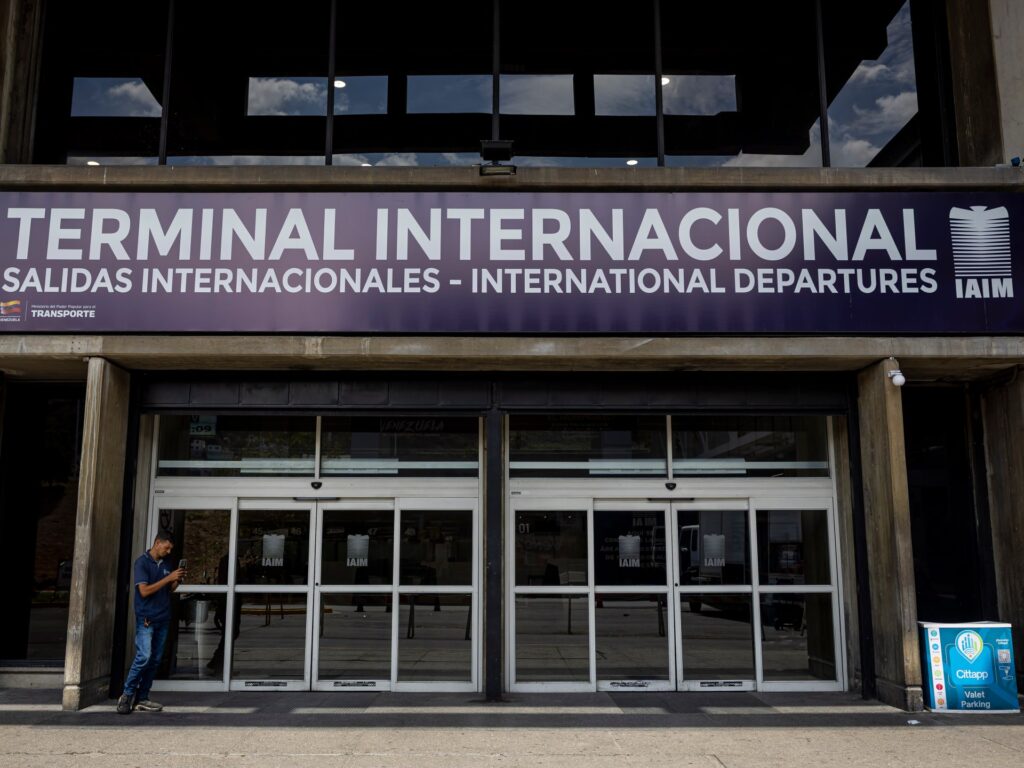Venezuela has revoked operating permits for six international airlines after they suspended flights to the country following a United States warning of airspace risk, in the latest point of tension between the two countries.
Last week, the US Federal Aviation Administration (FAA) warned of a “potentially hazardous situation” in Venezuelan airspace due to a “worsening security situation and heightened military activity”.
Recommended Stories
list of 4 itemsend of list
While Caracas said the FAA had no jurisdiction over its airspace, the decision led some airlines to indefinitely suspend flights to the South American country from November 24 to 28, Marisela de Loaiza, president of the Airlines Association in Venezuela, said.
The action comes amid worsening tensions between the US and Venezuela over President Donald Trump’s battle against what he calls ‘narco-terrorism’ in the Caribbean.
Since September, the US has carried out at least 21 strikes on vessels it accuses of trafficking drugs, killing at least 83 people. Venezuela has said the strikes amount to murder.

Which airlines has Venezuela banned and why?
On Wednesday night, Venezuela’s civil aviation authority announced that Spain’s Iberia, Portugal’s TAP, Colombia’s Avianca, Chile’s and Brazil’s LATAM, Brazil’s Gol and Turkish Airlines would have their permits revoked.
The authority said the decision was taken against the carriers for joining “the actions of state terrorism promoted by the United States government”.
Before the revocation, Venezuela’s government had issued a 48-hour deadline on Monday for airlines to resume their cancelled flights or risk losing their permits.
Airline carrier Iberia had said it plans to restart flights to Venezuela as soon as full safety conditions are met.
At the same time, Avianca announced in a statement on Wednesday its intention to reschedule cancelled flights to the Venezuelan capital by December 5.
But Portuguese Foreign Minister Paulo Rangel called the decision to revoke permits “disproportionate”.
“What we have to do is, through our embassy, make the Venezuelan authorities aware that this measure is disproportionate, that we have no intention of cancelling our routes to Venezuela, and that we only did this for security reasons,” he said.
What about other airlines operating in Venezuela?
Spain’s Air Europa and Plus Ultra have also suspended flights to Venezuela, but their permits have not been revoked, with no reason given for the exemption.
Panama’s Copa and its low-cost airline, Wingo, are continuing to operate to Venezuela. Domestic airlines, including the flag-carrier, Conviasa, flying from Venezuela to Colombia, Panama and Cuba are also still in operation.
What is behind US-Venezuela tensions?
Since US President Donald Trump’s return to office in January, tensions between his administration and Venezuela’s government have ramped up.
The US has built up a large military presence off the coast of Venezuela – its most significant military deployment to the Caribbean in decades – to combat what it claims is the trafficking of drugs.
The Trump administration has frequently claimed that Venezuelan President Nicolas Maduro is behind the drug trade, without providing any evidence to support this.
In August, the US government raised its reward for information leading to Maduro’s arrest from $25m to $50m.
Maduro denies that he is involved in the drug trade.
This week, the US designated the Cartel de los Soles (Cartel of the Suns) a foreign “terrorist” organisation. It also claims the group is headed by Maduro and a senior figure in his government.
Venezuela’s foreign ministry said it “categorically, firmly and absolutely rejected” the designation, describing it as a “new and ridiculous lie”.
Moreover, the US has long rejected Maduro’s government, calling his election win last year “rigged”. In November 2024, the US recognised Venezuela’s opposition leader, Edmundo Gonzalez, as the country’s rightful president.
The Venezuelan government has suggested that the drug operation in the Caribbean and eastern Pacific is a cover for the US’s real aim of deposing Maduro from government – something some observers also believe.
Since September, the US has conducted at least 21 strikes on Venezuelan vessels in the Caribbean and eastern Pacific, claiming they are drug boats. More than 80 people have been killed, but the Trump administration has provided no evidence for its claims.
Last month, the US military conducted bomber flights up to the coast of Venezuela as part of a training exercise to simulate an attack, and sent the world’s largest aircraft carrier, USS Gerald R Ford, into the region.
However, in recent days, Trump has shown a willingness to hold direct talks.
On Wednesday, Trump told reporters on board his presidential plane, Air Force One, that he “might talk” to Maduro but warned “we can do things the easy way, that’s fine, and if we have to do it the hard way, that’s fine, too”.

What has Trump said about anti-drug land operations in Venezuela?
On Thursday, Trump warned that land operations to combat drug trafficking by land could begin “very soon”.
“You probably noticed that people aren’t wanting to be delivering by sea, and we’ll be starting to stop them by land also,” Trump said in remarks to troops stationed around the globe to mark the US holiday, Thanksgiving.
“The land is easier, but that’s going to start very soon.”
“We warned them to stop sending poison to our country,” he added.
https://www.aljazeera.com/news/2025/11/28/why-has-venezuela-banned-six-international-airlines-amid-us-tensions?traffic_source=rss


